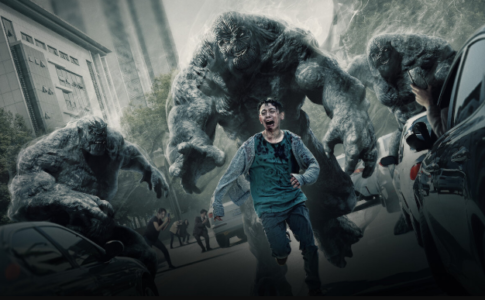A Deep Dive into the Themes of Faith and Morality in Yeon Sang-ho’s Latest Series
When Hellbound comes up in conversation, it’s hard not to hear the familiar comparison: “It’s even more popular than Squid Game!” Whether it will maintain this status remains to be seen, but the link to Squid Game is often made, primarily for SEO purposes. With its share of gore, violence, and social commentary, Hellbound does bear some similarities. However, it diverges significantly by raising uncomfortable questions about divinity and higher powers. Central to its narrative is a world where sinners are brutally killed by powerful black giants who emerge suddenly to deliver divine retribution.
The tension of impending doom is heightened by the appearance of a seemingly divine force, which reveals the date and time of death to the condemned. The show delves into humanity’s response to such explicit displays of divine punishment and the moral dilemmas that arise from it.
Initially, this strange phenomenon began several years prior to the events of the series, leaving society shaken and anxious about the future. As expected, some individuals seek to profit from the situation, broadcasting the killings for gain, while others use live streaming to comment on the events. This public anxiety gives rise to the New Truth Society, a cult-like organization that exploits fear and ignorance, even as its members claim to understand the divine rationale behind the executions.
The narrative is divided into two parts: the first three episodes focus on the emergence of the New Truth Society and its enigmatic leader, Jeong Jin-soo (Yoo Ah-in), who harbors his own secrets. The latter half jumps five years ahead, showcasing a society deeply influenced by the society’s rise to power, featuring the story of Bae Young-jae (Park Jeong-min), a jaded television producer who finds himself entangled in the society’s schemes.
While the series thoughtfully explores human nature and society’s tendency to exploit disasters—aptly resonating with current global circumstances—it also raises crucial questions about the morality of the divine. The show does not confine itself to the traditional Judeo-Christian depiction of God, nor does it specify which deity is responsible for the brutal acts. Instead, it draws parallels to charismatic religious movements, illustrating the moral ambiguities surrounding divine judgment.
This brings forth the existential queries: Is God benevolent? Is divine justice equitable? Does God even care about humanity?
The narrative resonates with Stephen Fry’s well-known critique of divine morality: “How dare you create a world in which there is much misery that is not our fault?” Up to this point in Hellbound, the authority of God (or the divine force behind the killings) has seemed unquestionable; the primary focus remains on why certain individuals face such judgment, rather than questioning the validity of that judgment itself. As the series progresses, however, it casts doubt on the righteousness of these brutal executions. Were they justified? Was there a divine purpose behind them?
These questions lead us to ponder why suffering exists in the world. The show suggests that God’s nature may be capricious, a concept that transcends specific religions. Witnessing any form of divine injustice can trigger this fundamental inquiry, regardless of one’s faith.
Before the viewer has time to dwell on these weighty themes, Hellbound throws unexpected twists into the mix, altering the rules established in the earlier episodes. Perhaps this is to ensure that the series does not end on a purely bleak note, hinting at the possibility of a Season 2.
Creator Yeon Sang-ho has indicated that the series is rooted in “cosmic horror,” drawing comparisons to Lovecraftian tales such as Beyond the Mountains of Madness. Lovecraft’s work often delves into themes of humanity’s insignificance in the face of incomprehensible, otherworldly forces. This perspective may offer a more palatable interpretation than a portrayal of a cruel God delivering arbitrary punishment.
Hellbound is not merely a commentary on human behavior and our relationship with the divine; it also serves as an exploration of God’s perplexing nature and the frustrating opacity surrounding divine intentions. As the story unfolds, the portrayal of God may evolve, but for now, it presents a grim reality under the watch of a seemingly indifferent deity. In this universe, individuals appear powerless to alter their fate.
Hellbound
Director: Yeon Sang-ho
Writer: Choi Kyu-sok
Cast: Yoo Ah-in (Jeong Jin-soo), Kim Hyun-joo (Min Hye-jin), Park Jeong-min (Bae Young-jae), Won Jin-ah (Song So-hyun), Yang Ik-june (Jin Kyeong-hoon)
Running Time: 6 episodes of 50-60 minutes
Genres: Fantasy, Horror, Thriller, Post-apocalyptic








